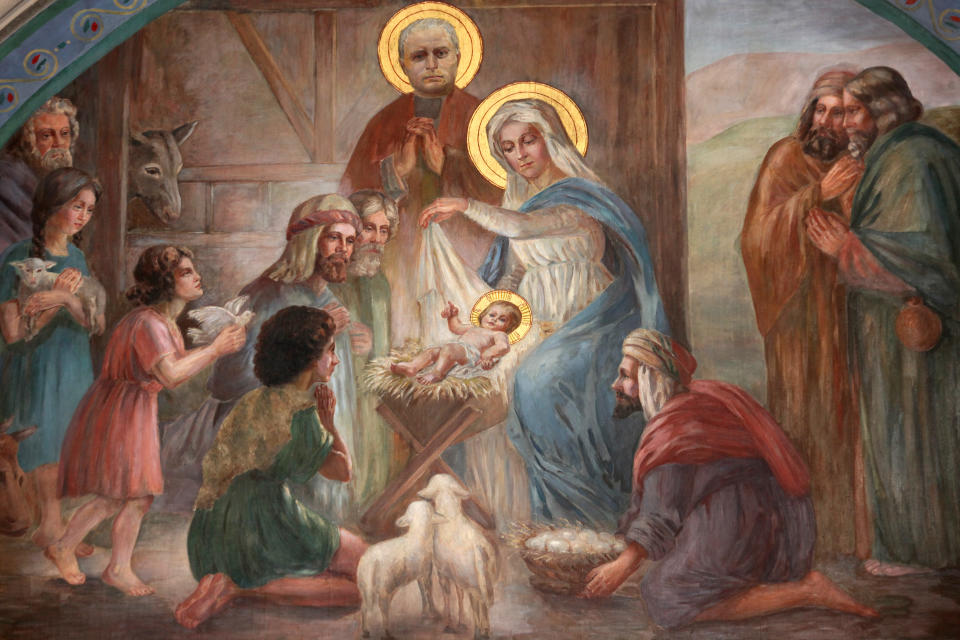D.C. Archdiocese sues Washington Metro over rejected Christmas ad

The Archdiocese of Washington sued the Washington Metropolitan Area Transit Authority (WMATA) on Tuesday for rejecting advertisements intended for buses and bus stops.
The archdiocese accuses WMATA, the government agency that operates the Metrobus service, of violating its First Amendment rights and limiting its ability to exercise its faith by censoring an advertisement with a Christmas theme and bearing the slogan “Find the Perfect Gift.”
The rejected ad features shepherds seeing the Star of Bethlehem in the night sky on their journey to visit Jesus after his birth. The only words on the advertisement are “Find the perfect gift,” “FindThePerfectGift.org” and “#perfectgift.” The website (but not the ad) defines the “perfect gift” as Jesus and the hope he brings.
The ad that was submitted to WMATA shows shepherds and a starry sky. It contains no explicit reference to religion, religious practice, or belief. “It’s meant to appeal to a wide audience,” archdiocese spokesperson Chieko Noguchi told Yahoo News.
She said the Archdiocese’s “Find the Perfect Gift” initiative will proceed this Advent regardless of this lawsuit, in the hope that ideally, people of all faiths and backgrounds will get to experience “the joyful spirit of the season.”
Ed McFadden, the secretary for communications for the Archdiocese, characterized the ad as a “simple message of hope” and an “invitation to participate in the Christmas season.” He took issue with WMATA’s explanation that the ad was rejected because it “depicts a religious scene and thus seeks to promote religion.”
“To borrow from a favorite Christmas story, under WMATA’s guidelines, if the ads are about packages, boxes or bags … if Christmas comes from a store … then it seems WMATA approves. But if Christmas means a little bit more, WMATA plays Grinch,” McFadden said in a statement.

Susan Timoney, the secretary for pastoral ministry and social concerns for the Archdiocese, said that the intent was that the advertisement on bus stops would reach the widest possible audience, as an invitation to experience the “well-accepted joyful spirit of the season,” and to encourage helping the less fortunate.
“The Archdiocese wishes to encourage our society to help feed, clothe, and care for our most vulnerable neighbors, and to share our blessings, and welcome all who wish to hear the Good News,” Timoney said in a statement.
Attorney Paul Clement, who is serving as the Archdiocese’s counsel on this case, said the rejection violates the First Amendment, “plain and simple.” He said the government shouldn’t be able to restrict religious speech in a particular forum that otherwise permits a wide variety of speech.
The American Civil Liberties Union (ACLU) challenged the transit system on the same grounds this past summer by filing lawsuits on behalf of four groups whose ads were also rejected. The ACLU itself wanted to display an ad featuring the First Amendment in English, Spanish and Arabic. A women’s health care collective called Carafem wanted to advertise medical abortions using what was called a “10-Week-After Pill.” People for the Ethical Treatment of Animals wanted ads urging people to “Go Vegan.” And the company of right-wing provocateur Milo Yiannopoulos, Milo Worldwide LLC, was upset after WMATA first accepted, then removed, ads for his book “Dangerous,” after passengers complained.
Arthur B. Spitzer, the legal director of the ACLU for the District of Columbia, said the message of the Christmas ad — looking for the spiritual, not just the commercial, aspect of Christmas — would probably not appear controversial to most people, but that the transit authority probably feels that accepting any religious ad might set the agency on a slippery slope.

“We’re delighted that the Catholic archdiocese agrees with us that METRO’s advertising policies violate the First Amendment,” Spitzer told Yahoo News. “These guidelines are vague and allow METRO to exercise unguided discretion in picking which ads to accept and reject, allowing METRO to discriminate based on the views expressed in different ads, which is also contrary to the protections of the First Amendment. We wish them luck in their lawsuit.”
When Yahoo News reached out for comment, Metro spokesperson Sherri Ly responded via email, “In 2015, WMATA changed its advertising policy to prohibit issue-oriented advertising, including political, religious and advocacy advertising. The ad in question was declined because it is prohibited by WMATA’s current advertising guidelines.”
For many years, WMATA maintained a fairly open advertising forum that accepted materials from a wide array of people on many issues. WMATA required only that the ad include a disclaimer that its content represented the view of the sponsor and not that of the transit authority. But in 2015, anti-Muslim activist Pamela Gellar’s American Freedom Defense Initiative proposed to display an ad with an image of the Prophet Muhammad, and WMATA decided to change its policy to ban issue-related advertisements, which meant rejecting religious or political messages.
“They want to have the flexibility to reject ads that they think will cause protest and controversy, like the ad for Milo Yiannopoulos’ book did,” Spitzer said. “The First Amendment protects all kinds of speech. It doesn’t only protect speech that everybody agrees with. It doesn’t only protect speech which is noncontroversial. The whole point of the First Amendment is to allow people to express new, different and controversial ideas so that others might be persuaded or not.”
Spitzer said the United States would have never have permitted same-sex marriage or women’s suffrage if people hadn’t been allowed to talk about these causes when they were a burning topic of public debate: “There are many things we take for granted in today’s society that once upon a time were very controversial.”
Read more from Yahoo News:


